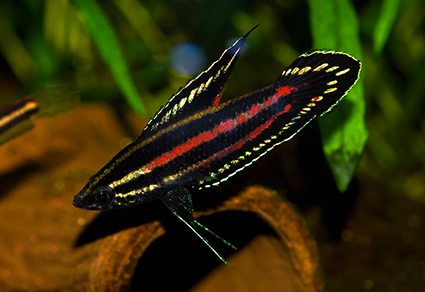Abstract
We describe two new species of Parosphromenus from Indonesia based on morphological and molecular diagnoses. Parosphromenus juelinae, sp. nov., occurs on Bangka Island. Its unpaired fin coloration is similar to that of P. deissneri, but it differs from the latter in having a rounded caudal fin with a non-filamentous branched median ray and a smaller anal fin. Although the new species has the same caudal fin structure as P. bintan, it can be distinguished from the latter by its distinct unpaired fin coloration and the intense red color on the body flanks. Parosphromenus kishii, sp. nov., is found only in a single river system in Kalimantan Tengah. It is distinguished from all other congeners by the unique coloration of its caudal fin. A phylogenetic tree based on the cytochrome b (cytb) gene indicates that the two new species are distinct monophyletic groups constituting distinct phylogenetic branches from their congeners. Cytochrome b Genetic distances between Parosphromenus juelinae, sp. nov., and Parosphromenus kishii, sp. nov., and the other taxa in the phylogenetic tree range from 2.44% to 19.52% and from 8.65% to 17.28%, respectively.
References
Armitage, D. (2002) Bettas & Co. von Bangka und Belitung. Das Aquarium, 397, 10–15.
Bleeker, P. (1859) Negende bijdrage tot de kennis der vischfauna van Banka. Natuurkundig Tijdschrift voor Nederlandsch Indië, 18, 359–378. https://doi.org/10.5962/bhl.title.144153
Brown, B. (1987) Special announcement—two new Anabantoid species. Aquarist and Pondkeeper, 1987, 34.
Cracraft, J. (1989) Speciation and Its Ontology: The Empirical Consequences of Alternative Species Concepts for Understanding Patterns and Processes of Differentiation. In: Daniel, O. & John, A.E. (Eds.), Speciation and Its Consequences, Sinauer, Sunderland, Massachusetts, pp. 28–59.
Klausewitz, W. (1955) See- und Süsswasserfische von Sumatra und Java. Senckenbergiana Biologica, 36, 309–323.
Kottelat, M. (1991) Notes on the taxonomy and distribution of some western Indonesian freshwater fishes, with diagnoses of a new genus and six new species (Pisces: Cyprinidae, Belontiidae, and Chaudhuriidae). Ichthyological Exploration of Freshwaters, 2 (3), 273–287.
Kottelat, M. & Ng, P.K.L. (1998) Parosphromenus bintan, a new osphronemid fish from Bintan and Bangka islands, Indonesia, with redescription of P. deissneri. Ichthyological Exploration of Freshwaters, 8 (3), 263–272.
Kottelat, M. & Ng, P.K.L. (2005) Diagnoses of six new species of Parosphromenus (Teleostei: Osphronemidae) from Malay Peninsula and Borneo, with notes on other species. Raffles Bulletin of Zoology, Supplement 13, 101–113.
Kumar, S., Stecher, G., Li, M., Knyaz, C. & Tamura, K. (2018) MEGA X: Molecular Evolutionary Genetics Analysis across computing platforms. Molecular Biology and Evolution, 35, 1547–1549. https://doi.org/10.1093/molbev/msy096
Linke, H. (2014) Labyrinth Fish World with 1768 selected photographs. Fish Magazine Taiwan, New Taipei City, 577 pp.
Mayden R.L. & Wood R.M. (1995) Systematics, species concepts, and the evolutionarily significant unit in biodiversity and conservation biology. American Fisheries Society Symposium, 17, 58–113.
Rüber, L., Britz, L., Tan, H.H., Ng, P.K.L. & Zardoyz, R. (2004) Evolution of Mouthbrooding and Life–history correlates in the fighting fish genus Betta. Evolution, 58, 799–813. https://doi.org/10.1111/j.0014-3820.2004.tb00413.x
Schaller, D. (1985) Parosphromenus nagyi spec. nov., ein neuer Prachtgurami aus Malaysia (vorläufige Mitteilung). Die Aquarien- und Terrarien-Zeitschrift, 38, 301–303.
Schindler, I. & Linke, H. (2012) Two new species of the genus Parosphromenus (Teleostei: Osphronemidae) from Sumatra. Vertebrate Zoology, 62 (3), 399–406.
Tan, H.H. & Ng, P.K.L. (2005) The labyrinth fishes (Teleostei: Anabantoidei, Channoidei) of Sumatra, Indonesia. Raffles Bulletin Zoology, Supplement 13, 115–138.
Tan, H.H. & Jongkar, G. (2020) Parosphromenus barbarae, a new species of Licorice Gourami from Sarawak, Borneo (Teleostei: Osphronemidae). Vertebrate Zoology, 70 (3), 349–356. https://doi.org/10.26049/VZ70-3-2020-07
Turner, G.F. (1999) What is a fish species? Reviews in Fish Biology and Fisheries, 9, 281–297. https://doi.org/10.1023/A:1008903228512
Tweedie, M. (1952) Notes on Malayan fresh–water fishes. 3, The Anabantoid fishes; 4, New and interesting records; 5, Malay names. Bulletin of the Raffles Museum, 24, 63–95.
Vierke, J. (1979) Ein neuer Labyrinthfisch von Borneo––Parosphromenus parvulus nov. spec. Das Aquarium, 13 (120), 247–250.
Vierke, J. (1981) Parosphromenus filamentosus n. sp. aus SO Borneo (Pisces: Belontiidae). Senckenbergiana Biologica, 61, 363–367.
Warren, M.L. (1992) Variation of the spotted sunfish, Lepomis punctatus complex (Centrarchidae): meristics, morphometrics, pigmentation and species limits. Bulletin of the Alabama Museum of Natural History, 12, 1–47.
Zhou, A.G., Xie, S., Wang, Z., Fan, L., Chen, Y., Ye, Q., Zeng, F. & Zou, J. (2019) Genetic diversity and geographic differentiation in Northern Snakehead (Channa argus) based on mitochondrial Cytb gene. Pakistan Journal of Zoology, 51 (1), 359–362. https://doi.org/10.17582/journal.pjz/2019.51.1.sc2


